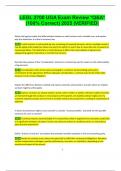LEGL 2700 UGA Exam Review *Q&A*
(100% Correct) 2025 |VERIFIED|
Define the legal principle that differentiates between a valid contract and a voidable one, and explain
why this distinction is critical in business law.
A valid contract is enforceable by law, containing all required elements, while a voidable contract
may be legally enforceable but allows one party the option to void it due to issues like lack of capacity or
misrepresentation. This distinction is critical because it affects the enforceability of agreements,
safeguarding against involuntary or misinformed consent.
Describe the purpose of the "consideration" element in contract law and its impact on the enforceability
of agreements.
Consideration refers to the value exchanged in a contract, demonstrating each party’s
commitment to the agreement. Without adequate consideration, a contract may not be enforceable
because it lacks mutual obligation.
Explain the difference between implied and express contracts and provide a scenario where an implied
contract might be enforceable.
Express contracts are clearly stated in words, either written or spoken, whereas implied contracts
are formed through the conduct or circumstances of the parties. An implied contract might arise if a
customer regularly accepts services from a provider without discussing terms, creating an expectation of
payment.
In what circumstances might a court consider a contract "unconscionable," and what are the possible
outcomes for such a contract?
A contract may be unconscionable if it is excessively unfair or oppressive to one party, usually due
to a significant imbalance of power. Courts may refuse to enforce it, modify its terms, or only enforce
parts that are deemed fair.
Define "breach of contract" and explain the potential remedies available to the non-breaching party.
Breach of contract occurs when one party fails to fulfill their contractual obligations. Remedies
include compensatory damages, specific performance, rescission, or restitution, depending on the
severity and impact of the breach.
1
,Describe the concept of "specific performance" and give an example of when it may be ordered by a
court.
Specific performance is a legal remedy that requires the breaching party to fulfill their contractual
duties as agreed, often used when monetary compensation is inadequate, such as in real estate
transactions where a unique property is involved.
Explain the function of "promissory estoppel" and its relevance in contract law.
Promissory estoppel allows enforcement of a promise even without consideration, if one party
reasonably relied on it to their detriment. This principle prevents unfair harm by holding parties
accountable for promises when reliance was justified.
What are the primary differences between bilateral and unilateral contracts, and in what type of contract
is acceptance based on performance?
Bilateral contracts involve mutual promises between parties, while unilateral contracts require
acceptance through performance rather than a promise. In a unilateral contract, acceptance occurs only
when the act is completed, such as in reward offers.
Discuss the legal doctrine of "capacity" in contract formation and why it is necessary for enforceable
contracts.
Capacity refers to the legal ability of parties to enter a contract, which typically excludes minors,
intoxicated individuals, or those with mental impairments. Without capacity, contracts are voidable to
protect vulnerable parties from exploitation.
What constitutes "fraudulent misrepresentation" in contract law, and how does it affect the contract's
validity?
Fraudulent misrepresentation involves a false statement knowingly made to induce another party
into a contract. This renders the contract voidable, allowing the misled party to rescind it and seek
damages if necessary.
Differentiate between "duress" and "undue influence" in the context of contracts and provide examples
for each.
Duress occurs when one party is forced into a contract through threats or coercion, whereas
undue influence involves exploiting a close relationship to unfairly sway the other party’s decision.
2
, Duress could be physical threats, while undue influence might involve taking advantage of an elderly
relative’s trust.
Explain "anticipatory repudiation" and discuss the remedies available to the non-breaching party in such
cases.
Anticipatory repudiation occurs when one party informs the other of their intent to not perform
contractual obligations before the performance is due. The non-breaching party may sue for damages
immediately or wait until the performance date to seek legal remedies.
Describe the legal implications of an exculpatory clause in a contract, and give an example where it
might be enforceable or unenforceable.
Exculpatory clauses attempt to limit a party’s liability for damages. They are enforceable in some
cases, such as recreational activity waivers, but unenforceable when they absolve responsibility for gross
negligence or intentional harm.
What is the difference between compensatory and punitive damages, and in what cases might punitive
damages be awarded?
Compensatory damages aim to cover actual losses, while punitive damages are awarded to
punish wrongful conduct and deter future misconduct, typically in cases of fraud or willful negligence.
Discuss the statute of frauds and why it requires certain contracts to be in writing.
The statute of frauds mandates written contracts for specific agreements, such as those involving
real estate or exceeding one year, to reduce fraud and ensure clear evidence of terms, enhancing
enforceability.
Explain the purpose of an "option contract" and under what circumstances it might be used.
An option contract is a separate agreement that holds an offer open for a specified period,
allowing the buyer time to decide without fear of the offer being revoked. This is common in real estate
or business negotiations.
Define "consideration" in contract law and give an example of sufficient versus insufficient consideration.
Consideration involves something of value exchanged by each party to validate a contract. Paying
market value for goods is sufficient, while a token gift like $1 for a car may be insufficient and deemed a
"sham" consideration.
3




